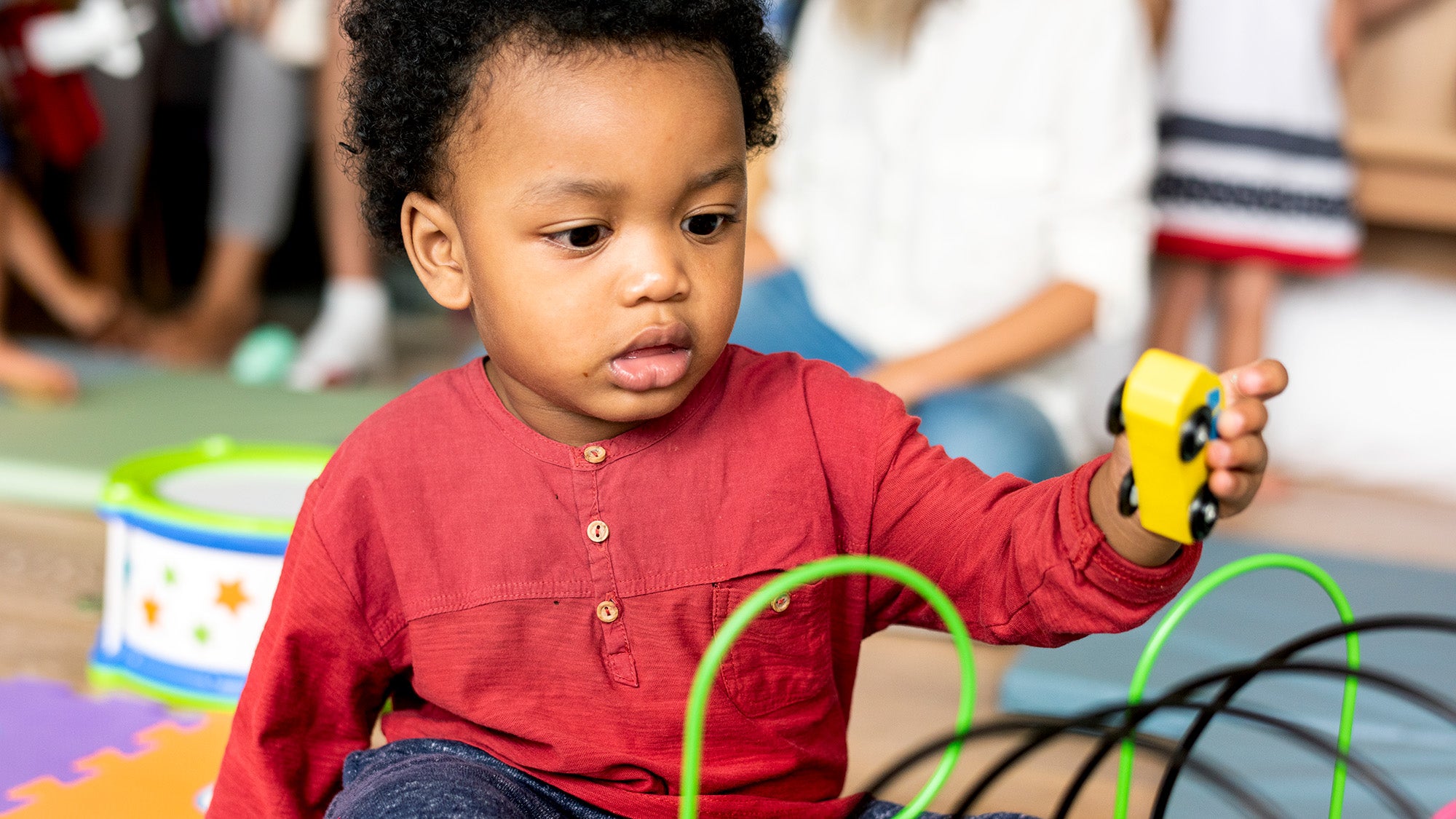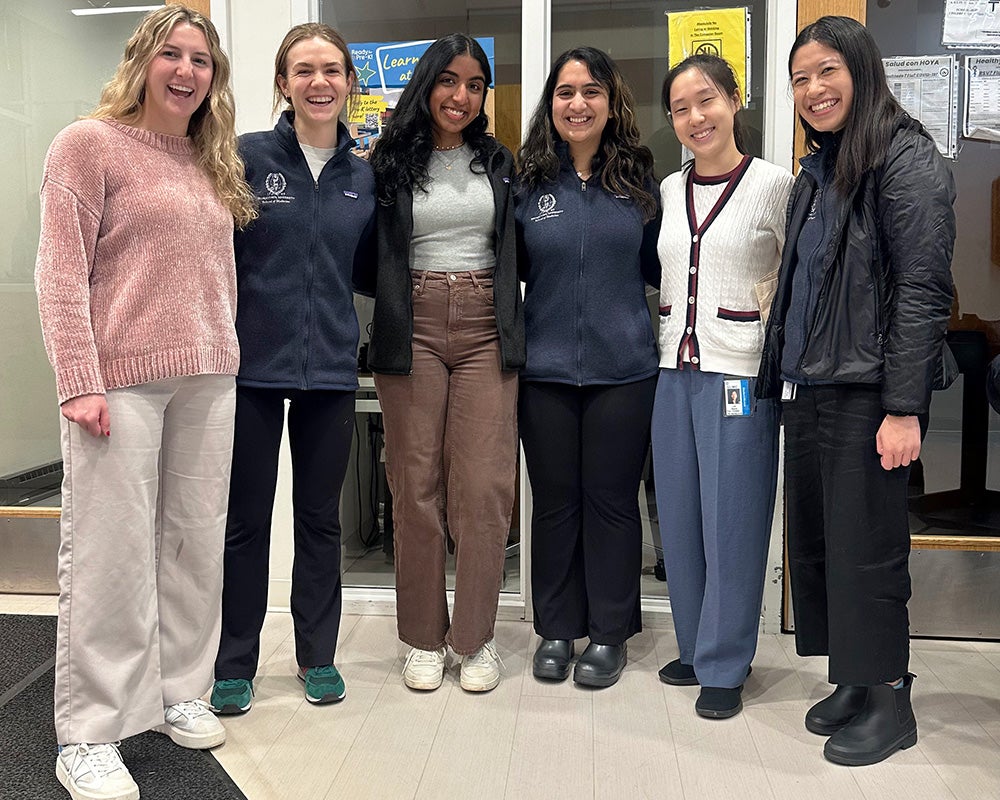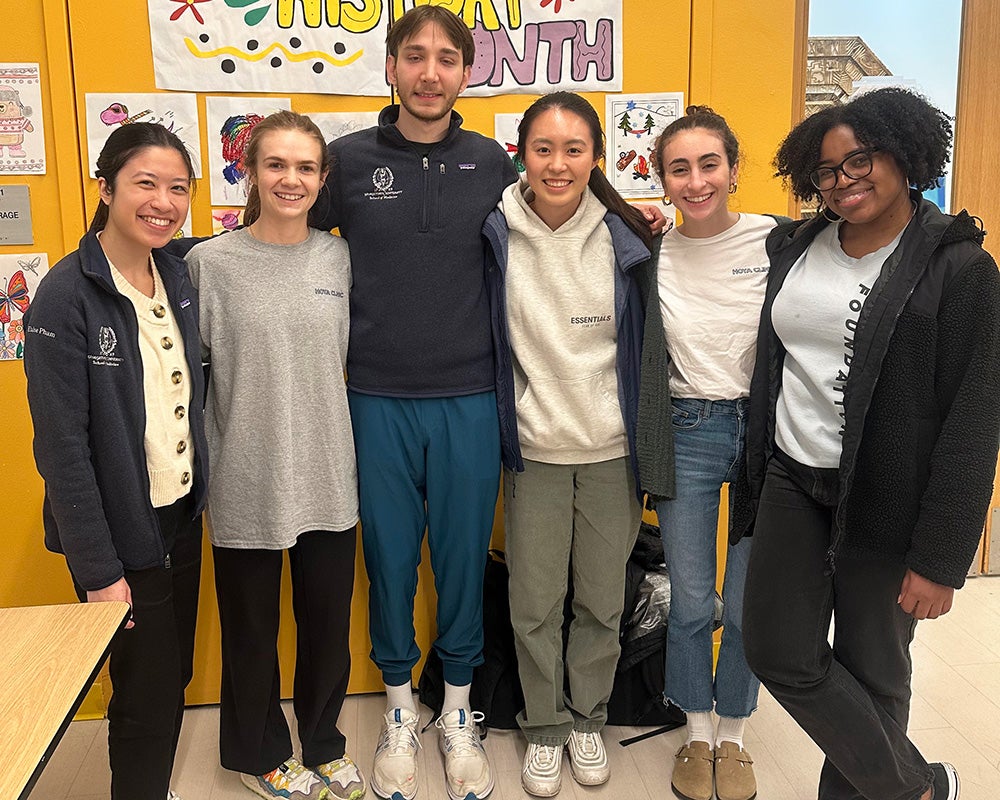Medical Students Provide Early Childhood Assessments To Help Disadvantaged Children Reach Developmental Milestones

Posted in News Stories | Tagged CAT Clinic, community outreach, HOYA Clinic, service to others
(January 10, 2025) — One Friday evening every month during the academic year, a small group of medical students sets up tables full of coloring and craft activities to prepare for the arrival of children and their families at the Child Assessment Clinic, or CAT clinic as students prefer to call it. The clinic is part of HOYA Clinic, which provides quality health care to underserved families in Washington, D.C., free of charge in the spirit of social justice and cura personalis.
“Just interacting with the kids one-on-one while doing arts and crafts makes me excited to attend CAT clinic,” said Margaret Hughes (M’26), a CAT clinic leader for 2023-’24. “Focusing on the kids developmentally, in addition to their physical health, is so important for these kids who often have adverse, challenging life experiences they have no control over.”

The CAT clinic operates out of The Triumph, a temporary housing facility located in Ward 8, and just expanded its operations to another family emergency shelter, the Kennedy Center, in Ward 4.
“The expansion to the Kennedy Center was over a year in the making,” said Christine Chow (M’27), the 2024-’25 CAT clinic leader. “The new location gives us a chance to interact with a different population and new sets of families to provide more assessments and referrals, when needed.”
In the three years the CAT clinic has been operational, medical student volunteers have assessed over 130 children and referred 10 for further evaluation. The medical students screen for red flags that indicate developmental delays in order to encourage early intervention.
A Commitment to Children
Many medical students are first drawn to participate in the CAT clinic because of their previous background working with children. Potential volunteers are asked about their prior work experience with children as part of the application process.
“We have a relatively small list of volunteers, but they are all motivated to participate and even help fill in on clinic nights they weren’t initially scheduled for,” said Mary Tresvalles (M’27). “The kids also appreciate seeing familiar faces and would tell us they remembered coloring or playing tic-tac-toe with one of us, and you can just see in their faces how it made them feel to have that interaction.”
“I have a background in child education, and I had an interest in CAT clinic to work in promoting kids reach their educational milestones,” said Chow. “It’s also great for these kids to have the opportunity to interact with medical students one-on-one outside of the assessment to inspire kids to think about higher education and their future.”
“It’s also really fun to see my peers in the CAT clinic setting instead of an anatomy lab or another academic setting,” said Hughes. “To see my peers interact instead with young children is just a fun and rewarding experience outside of day-to-day studying.”
A Family Affair
During the two-hour clinic, medical students complete the ASQ-3 questionnaire with children, evaluating their gross and fine motor, communication and social skills to determine if the children are performing in line with specific developmental milestones. Medical students are trained by staff from Strong Start DC Early Intervention Program (DC EIP) before performing the assessments, which require 15 to 20 minutes to complete.

“We talk to parents after completing the assessments and always try to highlight what the child is doing very well and to reassure their parents when they are hitting developmental milestones,” said Jue Wang (M’26), a 2023-’24 CAT clinic leader. “We also talk to parents about areas of concern and how to start the referral process to DC EIP.”
The medical students spend time building a rapport with parents at the clinics in order to assure families that the assessments are helpful in identifying where early intervention could be useful in helping children reach developmental milestones. Entire families usually attend the CAT clinic, resulting in the medical student volunteers interacting with the older siblings of a child undergoing an assessment.
“We only do assessments on children under the age of 5,” explained Olivia Allen (M’27). “We also have to have permission from the parents for the assessment, which can be a difficult conversation for parents who could be skeptical of the process.” Allen, who worked in special education before attending medical school, expressed how hard it is for parents to recognize developmental delays and to find the extra support they need for their children, especially if the children transition between schools.
“We interact with parents who are very proactive and have noticed things at home that make them want to get all the information they can about their child, and we also encounter parents who are skeptical of us offering information about their child that may be difficult to hear,” said Tresvalles. “We try to frame the more difficult conversations not from the perspective that there’s something wrong with the child, but rather identifying whether extra support is needed at home or school to help a child, for example, speak who may not be speaking yet.”
More Than an Assessment
Medical student volunteers spend a considerable amount of time planning activities for each clinic that are often themed for the time of year. “We made Halloween masks and costumes at our October clinic, and in December holiday card crafts,” said Wang.
“One of the really valuable things about CAT clinic that we’ve heard from parents is that it provides kids a space to do imaginative play with other kids and families as well as our volunteers,” said Tresvalles. “Just having the opportunity to play with other kids and do activities is developing socializing skills, which could be a skill some children don’t often have the time or space to practice.”
“The clinic is also nice for parents because we play with the kids and do fun activities while they can step back or work on another responsibility they have,” said Allen. “These parents have a lot on their plate, so just to have someone come and interact and play with their kid one-on-one for 30 minutes on a Friday night means a lot to them.”
Heather Wilpone-Welborn
GUMC Communications
